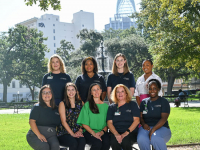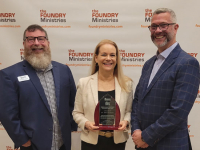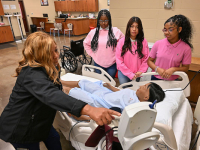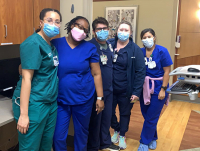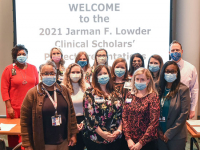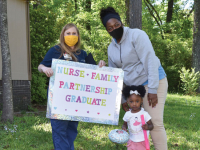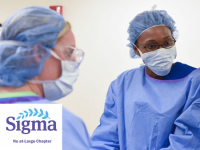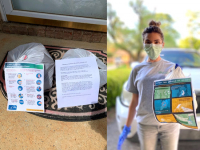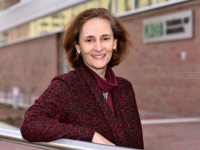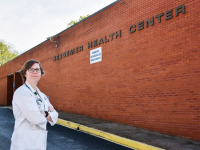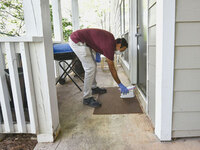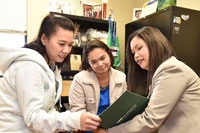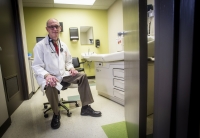By Erica Techo
The University of Alabama at Birmingham School of Nursing’s PATH Clinic provides care to underserved and uninsured adults with diabetes in and around the Birmingham community. Even though the nurse-managed clinic is not seeing patients in person in order to promote social distancing during the novel coronavirus (COVID-19) pandemic, the clinic remains dedicated to providing vital care and medication.
Thanks to advanced planning and innovative thinking, the clinic is able to operate remotely, utilizing telehealth and contactless insulin drop-off. The clinic’s care is provided by an interprofessional team of providers including nursing, social work, nutrition, optometry, medicine, mental health and physical therapy. Beginning in May, five nurse practitioner students will join the clinic's team, gaining valuable experience in telehealth as well as clinic hours. Medical residents, optometry interns and physical therapy students will also join when the clinic reopens for regular operations.
“As soon as we started hearing of COVID-19 and what groups were at high risk, we knew it could hit our patients really hard,” said Associate Professor, Assistant Dean for Graduate Clinical Education and PATH Clinic Director Michele Talley, PhD, ACNP-BC, FAANP. “They often have cardiac disease and other related conditions placing them in a high risk and vulnerable group for serious cases of COVID-19, so we started planning for this situation as soon as possible.”
Many patients at the PATH Clinic have no or limited access to the internet and technology necessary for virtual meetings and telehealth equipment, Talley said, but regular phone calls with patients allow care providers to assess health and appropriate next steps.
“When caring for patients with diabetes, a lot of the information that providers need can be obtained through asking specific questions and listening to the patient’s responses,” Talley said. “We can cover important topics, such as diet and exercise, and also approach treatment needs that includes how much insulin they take, how many insulin pens they have left, and when necessary, we can talk patients through the process of switching insulins.”
Interprofessional partnerships and conversations with other nurse-managed clinical initiatives in the School of Nursing, including the Nurse Family Partnership of Central Alabama, supported the PATH Clinic as providers developed plans for medication access. Care providers feel it is their mission to help, Talley said, and the entire PATH Clinic team has gone above and beyond the call of duty. From calling local pharmacies to check insulin supply, to reestablishing care for patients who have lost their jobs and insurance access, to making deliveries, the clinic support is palpable.
 “The reason we all do what we do is because we care about the people we’re helping, and these people care about us. They often ask if we’re taking care of ourselves as well,” Talley said. “On a daily basis, our patients are also so appreciative. We had one patient call to say, ‘I just want to take a minute to thank everyone who played a role in delivering this insulin.’ He knew it wasn’t just one person, and that these deliveries wouldn’t be possible without our interprofessional partners and teamwork.”
“The reason we all do what we do is because we care about the people we’re helping, and these people care about us. They often ask if we’re taking care of ourselves as well,” Talley said. “On a daily basis, our patients are also so appreciative. We had one patient call to say, ‘I just want to take a minute to thank everyone who played a role in delivering this insulin.’ He knew it wasn’t just one person, and that these deliveries wouldn’t be possible without our interprofessional partners and teamwork.”
Right now, Talley said, connection with patients is especially important. Many patients face additional stressors due to COVID-19, so the clinic team is able to offer a listening ear and connection to resources other than medication.
“It’s a scary time for everybody, and when we’re calling as health care providers, most patients ask questions about COVID-19 and open up about being scared or stress eating as a coping mechanism,” Talley said. “In either case, we’ll talk about their diabetes care, and then consult their behavioral health team, to ensure they’re getting all of the care they need. Sometimes it’s as simple as providing tips on healthy coping mechanisms with COVID-19, other times it involves connecting to community resources for food.
While COVID-19 has created new obstacles and challenges for access to care and resources, Talley said it has also highlighted the power of collaboration and community.
“Everybody has really stepped up to the plate to help,” she continued. “That’s what has been so refreshing to see – everyone is willing to help, and it’s bringing a lot of people together.”

